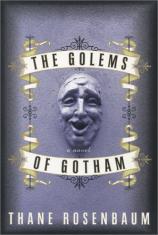Reading Group Guide
Discussion Questions
The Golems of Gotham

1. In the novel's riveting first scene, Lothar Levin shoots himself in the head while standing at the bima of his Miami synagogue. His wife, Rose, dies simultaneously in the sanctuary after taking cyanide. Why did the couple choose to commit suicide during a temple service? How are the details of their deaths -- the location, the methods, etc. -- significant to the story?
2. In the same scene, Rosenbaum reflects on what may have been in Rose's and Lothar's minds before they killed themselves: God, he suggests, "had become irrelevant, a lame-duck divinity, a sham for a savior, a mere caricature of a god who cared." (p. 3) How, if at all, might their sentiments have changed after their return to earth as golems? What "proof" does Rosenbaum give for God's concern or indifference to us?
3. A lighthouse on the Hudson River figures largely in the book -- as the place where Ariel finds the clay to create the Golems, as the setting for Oliver's wedding, and later, his attempted suicide. How does the story of the lighthouse, which Oliver used to read to Ariel when she was very young, tie into its role in the novel? What does Ariel mean when she thinks, "I'm a lot like the lighthouse. All kids are really tiny lighthouses trying to rescue their parents"?
4. Ariel comments that "Some family histories are so big, the future can't overshadow the past. The climax and crescendo has already happened, and nothing will ever rate as large again. The Holocaust is that way with us." (p. 42) Can you think of any major events that have impacted future generations of your own family? How has the Holocaust affected your life? What about the events of September 11?
5. Oliver, an orphan, never knew the reasons for his parents' suicide. Likewise, Ariel doesn't know why her mother left her and Oliver. What are some of the long-term effects on children whose parents have willingly disappeared from their lives? How does such abandonment affect the relationships they form as adults?
6. The ghosts of Primo Levi and Jean Amery represent two opposing views of humanity. In the story, Levi is a "life-affirming optimist," while Amery asserts that faith in humanity could never again be recaptured. How does Rosenbaum use his novel as a forum to examine these divergent views? Where do you fall in the spectrum?
7. What do you think of the fantasy element of Rosenbaum's book? What is the effect of the author's juxtaposing ghosts, images of the Holocaust Jewish mysticism and renewal, and medieval Jewish history onto the bustling streets of a modern city?
8. How does Rosenbaum use comedy in the novel? Does the Golems' squabbling, their comic actions, and the slapstick detract from the book's more somber themes -- or enhance them?
9. Was Ariel's experiment with the Golems successful? Did they go too far in their efforts to remind the world about the Holocaust and how had the world failed them yet again? What made them decide that they had accomplished their task?
10. What role does Tanya Green play in the novel? She herself admits that she can't instruct Ariel on the violin. What can she teach her? What does she offer Oliver?
11. On page 149 Rosenbaum writes, "In the modern world the family cannot be sheltered, cannot save itself from itself, from dissolution and divorce and, in the extreme cases, annihilation. The family is a highly vulnerable entity, always in a perpetual state of code blue, too listless to fight back, and too fragile to resuscitate." Do you agree with this assessment of modern life? What steps does this book suggest we take to strengthen all families, not just Jewish ones?
12. How does this novel comment on the lives and works of writers, musicians, and other artists? Is it an artist's duty to confront horrible truths, even if those truths lead him or her to suicide? As a writer, how do you think Oliver will compare to Levi, Kosinski, Celan and others mentioned in the novel?
13.Early in the novel, Jean Amery spurns the phrase, "Never again," which he calls the "best slogan ever written," but also as trivial and ineffective. At the end of the novel, he reminds Oliver, "Never forget . . . which isn't the same thing as shouting Never Again!" What does he mean by this? Can words change history? Can you give examples of ways that slogans have been used to encourage or discourage certain kinds of behavior? Are they effective?
14. Various characters in the novel decry modern society for trivializing, diluting, and forgetting about the Holocaust. Do you agree with this assessment? If so, what can we do to assure that the Holocaust is not forgotten -- and not repeated?
The Golems of Gotham
- Publication Date: February 1, 2002
- Genres: Fiction
- Hardcover: 384 pages
- Publisher: HarperCollins
- ISBN-10: 0060184906
- ISBN-13: 9780060184902







